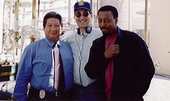 Blogger Brent McKee is talking today about what happens when TV shows undergo a major creative overhaul. One of the examples he uses is MARTIAL LAW:
Blogger Brent McKee is talking today about what happens when TV shows undergo a major creative overhaul. One of the examples he uses is MARTIAL LAW:
The first season was brilliant with one
of the few sour notes being the inclusion of Arsenio Hall as a cast member. It
didn’t get good ratings and the show was handed over to Lee Goldberg and William
Rabkin, who were posting on rec.arts.tv at the time. The gutted the show –
tossed out every actor except Sammo Hung, Kelly Hu and Arsenio Hall – and
created a sort of mytharc which was so incredibly stupid that even devoted fans
were sickened. I swear that if Rabkin and/or Goldberg were standing in front of
me at the time I’d have gotten as many good shots as I could and I have the
feeling a lot of fans would have done the same thing.
I won’t waste time defending our creative decisions on MARTIAL LAW (anyone remember Louis Mandylor? I didn’t think so), but I would hardly call the first season "brilliant" by any stretch. By far the biggest problem with the show was that it starred a guy who couldn’t speak English and a talkshow host pretending to be an actor, neither of whom liked each other much and both of whom were very difficult people to work with.
I’ve been integrally involved in the revamping of three shows — THE COSBY MYSTERIES, DIAGNOSIS MURDER, and SEAQUEST — and in each of those cases, I’d argue the shows were greatly improved (of course!). However of the three series, only DIAGNOSIS MURDER enjoyed a big spike in ratings and critical acclaim as a result of our changes.
The truth is that a revamped show rarely survives… and for good reason. A revamp is an act of total desperation. If the show wasn’t already in serious creative or ratings decline, it wouldn’t need an extreme make-over — or, in some cases, two or three (look how many formats ELLEN went through before it died). But there have been shows that have survived…and even thrived… after radical revamps, MANNIX being one of the best examples.
My favorite extreme TV series make-over revolved around a western called KLONDIKE…about cowboys in Alaska in the 1880s. The ratings sucked. So the show was pulled and it came back two weeks later as ACAPULCO. Same cast, different format, warmer setting. The change didn’t help and the show was cancelled after a few episodes…







